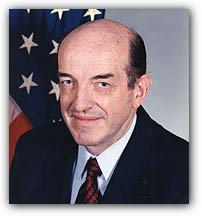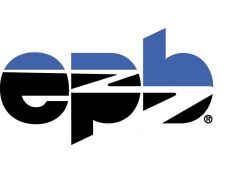
Fast, affordable Internet access for all.

Getting broadband out to all our citizens is not just something that would be nice for us to do. It is something essential for us to do if we want to provide individuals the opportunity to live productive and fulfilling lives in the Twenty-first century and something equally imperative if we want our country to have a competitive edge in this challenging world.But he moved on to highlight the importance of communities having the right to build their own networks, should they deem it necessary:
When incumbent providers cannot serve the broadband needs of some localities, local governments should be allowed--no, encouraged--to step up to the plate and ensure that their citizens are not left on the wrong side of the great divide. So it is regrettable that some states are considering, and even passing, legislation that could hinder local solutions to bring the benefits of broadband to their communities. It's exactly the wrong way to go. In this context, too, our previous infrastructure challenges must be the guide. The successful history of rural electrification, as one example, is due in no small part to municipal electric cooperatives that lit up corners of this country where investor-owned utilities had little incentive to go. Those coops turned on the lights for a lot of people! You know, our country would be a lot better off if we would learn from our past rather than try to defy or deny it.
 We strongly support his comments, while emphasizing that an incumbent that simply provides DSL or cable services must not be construed as necessarily serving the broadband needs of communities.
We strongly support his comments, while emphasizing that an incumbent that simply provides DSL or cable services must not be construed as necessarily serving the broadband needs of communities.Town participation in the WiredWest municipal telecommunications cooperative requires passing two consecutive town votes at separate meetings to establish Municipal Light Plant (MLP) legislation in the town. The MLP legislation was created in the Commonwealth over 100 years ago to enable towns to generate their own electricity. In 1996, the ability for towns to offer telecommunications services was added to the MLP statute. WiredWest charter towns researched various governance options and determined this was the best choice for enabling towns to offer telecommunications services, work together cooperatively and issue municipal debt to capitalize the network.Towns have been passing the 2/3 votes with overwhelming approval, as in the town of Florida, with a 30-1 vote. Wired West is maintaining an impressive map of the status of each town along the path. Clicking on a town brings up more information about that town. Kudos to them for making a great map that is easy to use and conveys a lot of information. The Berkshire Eagle recently published an op-ed discussing the importance of economic development in the area:
Because many Berkshirites work, either at home or in an office, in towns without high-speed Internet service, making such connections widely available is vital to economic development in the county.
This report is a brief summary of the Knowledge Exchange, written for participants and to share with the field. It reflects the open and frank discussions that took place during the convening, as well as the ease of communication among the group. The words in this report are quoted, paraphrased, and combined from presentation and discussion notes. The document includes ideas raised by individuals as well as collectively agreed-upon points. Overall, the 2010 Knowledge Exchange reflects just one moment in time in the midst of ongoing, overlapping conversations on these issues. This document is one of several publication projects emerging from the 2010 Knowledge Exchange that will be produced by CMJ. Strategy ideas, tools, case studies, and more will be available to our network members online through the MAG-Net website, www.mag-net.org. Facts, statistics, and other data are as of September 2010. For up-to-date media/telecom policy and campaign information, visit www.centerformediajustice.org and www.mag-net.org.
Thanks to Minnesota Public Radio for an update on stimulus broadband projects in NE MN. A massive non-profit middle-mile project called the NorthEast Service Cooperative will finally provide redundancy and modern connections to an area long neglected by Qwest.
Hundreds of miles of fiber optic cables will bring faster Internet access to the Arrowhead region of Minnesota by the end of this summer. Ground for a broadband network stretching 915 miles was broken yesterday. Sen. Al Franken (D-MN) and other politicians were on hand to tout the long-term economic significance of this federally funded project.
Soon, entire counties will not have to fear disastrous meltdowns from Qwest's inability to offer reliable services, as when they went 12 hours without any telecommunications, meaning police could not run background checks or run plates, credit cards and ATMs went offline, and border security had to use Canadian comms.
Northland News offered greater coverage as well as a video that would not embed here for reasons unknown.
The 915 miles of fiber optic network will stretch across eight counties in the Arrowhead Region and bring world class web speeds to the area.…
State lawmakers were also on hand at the ceremony and say this type of technology is pivotal to economic development.
"I want this to be the next step in people realizing that economic diversification on the Iron Range can be done because we are wired, we're ready to go, and we have a work force that is second to none," said state Sen. David Tomassoni.
We have to wonder how many of these legislators will support removing barriers in Minnesota law to communities building their own networks.
Note that the the NE Service Coop is a middle-mile network and that Frontier will be using it to improve their services.
We made certain Rep. Avila understood that that clarification gutted the exemption and she did not care. e-NC reports that the private sector providers are permitted to report an entire Census Block as having access to internet, if only one home in the block actually has it. In essence, North Carolina will have no "unserved areas" or communities will have to do their own door to door surveys, an expensive and monumental feat.But what do you expect from elected officials who calls something a "level field" while bragging that they are crafting rules (such as limited service territories) that only apply to the community networks, which already operate at a disadvantage to a $19 billion a year competitor like bill author Time Warner Cable? When the bill passed the Senate, a newspaper in Davidson noted its unequal approach that further handicapped communities:
Davidson Mayor John Woods said Tuesday MI-Connection deserves to be treated the same as private companies. “We strongly object to the territory limits that this bill will impose on MI-Connection which are not imposed on other broadband providers. In addition, MI-Connection would remain subject to open meeting laws, which do not apply to those other providers,” he said. Mr. Venzon also said local governments already face other rules that put them at a disadvantage to private competitors, including the requirement to operate under the N.C. Public Records Law.
This bill urges all municipalities to endeavor to utilize advanced broadband systems in their operations and to encourage the construction of advanced broadband systems.The full bill is available here [pdf] but the most interesting part is what was not included. As reported by Andy Sher of the Times Free Press, the bill was intended to go much further.
The bill would have let the municipal utilities extend service up to 30 miles outside their service areas.Unfortunately, the powerful incumbent lobbying machine (including AT&T, Comcast, and others who already hate having to compete with technologically superior networks in several Tennessee communities) killed the bill, a blow to the future of economic development in the state. Neighbors of Chattanooga, including Bradley County, desperately want access to the impressive 1Gbps network Chattanooga built -- the most advanced citywide network in the country.
 Harold DePriest recognized the power of AT&T and Comcast in the Legislature, but vowed not to give up.
Harold DePriest recognized the power of AT&T and Comcast in the Legislature, but vowed not to give up.
“Well, we would like to see the bill pass, but I think Gerald was dealing with the reality of the difficulty of moving the bill through the committee at this point in time,” he said Friday. “We will be back.
The PUD’s financial review resulted in a series of revised statistics that PUD engineers presented to commissioners Monday. Of the county’s 43,000 premises — mostly homes and businesses — 30,000 have access to fiber. Some 6,000 don’t have access because they live in areas where hookups are more costly, despite their often urban settings. In these areas, the cables that supply electricity are buried directly in the ground. Fiber hookups require costly trenching and installing conduit. Another 7,000 premises don’t have access because they’re very rural. Fiber access to all but the most rural of these locations will be funded jointly by a $25 million federal stimulus grant and PUD matching funds of about $8 million.Of the 30,000 with access, some 37% are taking a service (though they have to subscribe through independent service providers that contract with Chelan PUD due to Washington State law denying the opportunity for PUDs to offer retail services on their own network. Nonetheless, they are signing up 100 new customers per month. The problem is that some of the new connections are in high cost areas (whether due to distance or underground utilities).
Dan Olsen, who runs the municipal broadband service in Windom, was just about to leave work for the night when he got a call. The muckety-mucks at Fortune Transportation, a trucking company on the outskirts of town, were considering shuttering their office and leaving the area. "They said, Dan, you need to get your butt out here now," Olsen recalls. "I got there and they said, 'You need to build fiber out here. What would it take for you to do it?'" Fortune, which employs 47 people in the town of 4,600, two and a half hours southwest of the Twin Cities, relies on plenty of high-tech gadgetry. Broadband Internet access figures into how the company bids for jobs, communicates with road-bound truckers, controls the temperatures in its refrigerated trucks and remotely views its office in Roswell, New Mexico. Fortune even uses the Internet to monitor where and to what extent drivers fill their gas tanks in order to save money. Yet, when it was time to upgrade company systems three years ago, Fortune's private provider couldn't offer sufficient speeds. That's where Windomnet came in. Though Fortune was a mile outside the municipal provider's service area, "We jumped through the hoops and made it happen," recalls Olsen. "The council said, "Do it and we'll figure out how to pay for it.' We got a plow and a local crew. We had it built in 30 days."I have thought about this story frequently when I hear claims that publicly owned networks are failures.
In the ongoing effort to better network us network-type people, I wanted to note a site, Agrilan Rural Broadband Blog, that is working toward better rural broadband in upstate New York. I plan to put up short posts like this from time to time in hopes that people will get a better sense of who is near them (or has similar interests) for coalitions to advocate for broadband networks that are structurally accountable to communities.